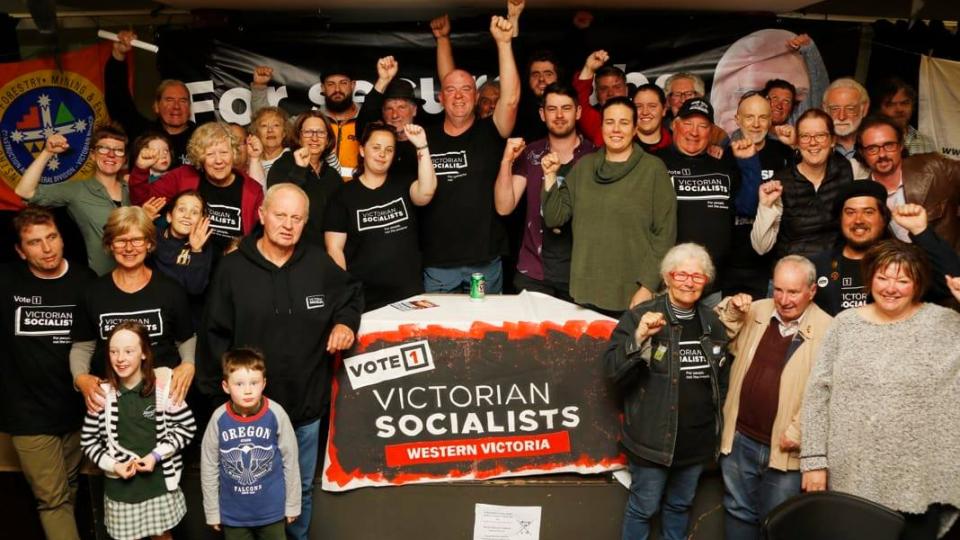An exceptional result for the Victorian Socialists

For a party only launched in May, Victorian Socialists achieved some exceptional results in the November 24 state elections.
In the Northern Metropolitan Region it won more than 4% of the votes and came fourth out of 19 parties in terms of first preference votes, behind only Labor, the Liberals and the Greens.
While the population in this inner Melbourne seat might be familiar with socialist and left ideas, the result represented something more as the campaign was able to engage a new range of activists.
In Western Victoria Region, having only decided in September to run, Victorian Socialists won 0.75% of the vote. The campaign took in rural and regional areas where socialists had not campaigned for decades.
Among those supporting the Victorian Socialists were migrant left groups, students and young workers, public housing tenants and trade unionists looking for real solutions and who want more than Labor’s promises.
Interest in socialist solutions was widespread. When we first started doorknocking, some new members were worried that they would be quizzed about socialist theory on people’s doorsteps. That didn’t happen.
Most people did not bat an eyelid about the word “socialist”, whether they were living in outer or inner city suburbs. People who had never met a socialist were very receptive to the practical proposals we offered to the problems that working class people face and our argument that we need a different system geared towards meeting peoples’ needs.
For decades, workers have been told that all they need to do is study hard at university or TAFE to get a good job and be able to buy a house and have a family.
In the past, this might have worked for sections of the working class. But this is not the case for the younger generation: they study hard at university, then struggle to get a job.
Even if they end up with a well-paid job, they know that they will probably never own a house. On top of this, most jobs are now insecure.
The capitalist promise of success if you work hard has evaporated.
People’s lived experiences are exposing the myths upon which capitalism has been built. A similar process is happening across the world.
Along with capitalism’s inability to provide economic security, the system is proving inadequate at resolving the biggest issue facing humanity — the climate crisis.
During the campaign, Victorian Socialists made a deliberate decision to focus on the economic issues affecting working class people. This did not mean that we refused to take up broader social issues, such as opening the borders to refugees, opposition to Islamophobia and racism, women’s and LGBTI rights and the climate crisis.
But we felt it was critical to focus on the economic issues affecting working people, because this is where the far right has had some success in convincing people that their economic worries are caused by migration and, in particular, non-white people.
Socialists cannot leave the debate over how to fix the economy to the racists and mainstream politicians.
All working-class people, regardless of race, religion, gender or age are affected by the same economic situation and cost-of-living pressures.
Therefore, unity over the fight for working-class solutions to unemployment, job insecurity, lack of affordable housing and cost of living pressures is important and the election campaign was an opportunity to do this.
Many people, especially youth, were very receptive to the idea that it is not enough to just fight for specific reforms and that we need to eliminate a system that priorities profits over people’s needs.
While the vote for Victorian Socialists was important and it would have been a fantastic victory to have elected a socialist MP, the campaign was about much more than votes.
It brought together an extraordinary number of people who made exceptional efforts to support this campaign.
There were many touching stories from the doorknocking. In suburbs in safe Labor seats, such as Broadmeadows, it became clear that Labor had not doorknocked in many years. In the several thousand houses we doorknocked there, we did not find anyone who had ever been visited by Labor.
Victorian Socialists received 7.73% of the vote in the lower house seat of Broadmeadows, just beating the Greens. This was a reflection of the involvement over many years of socialists, including myself, in the campaigns for jobs at Ford and Woolworths.
With all the focus on marginal seats, Labor ignored communities in safe Labor seats. In most polling booths in Broadmeadows only the Victorian Socialists and Labor handed out How-to-vote cards on election day. In some booths, Labor turned up quite late.
The 10% vote for Victorian Socialists in Richmond demonstrates the popularity of the grassroots campaigns that Yarra councillor Stephen Jolly has been involved in over many years.
We can take heart that there is a resurgence of interest in radical and socialist ideas, even while the racist right is seeking to consolidate itself inside major parties and in fringe parties.
It is important for the organised wing of the socialist movement to clock this resurgence of interest in socialism and to help grow it in such a way that it can assist working-class communities win the reforms they so badly need now.
Election campaigns are one way of doing this, but grassroots campaigns are also very important.
[Sue Bolton is a Moreland councillor, a Socialist Alliance national executive member and was a Victorian Socialists candidate in the Northern Metropolitan Region.]